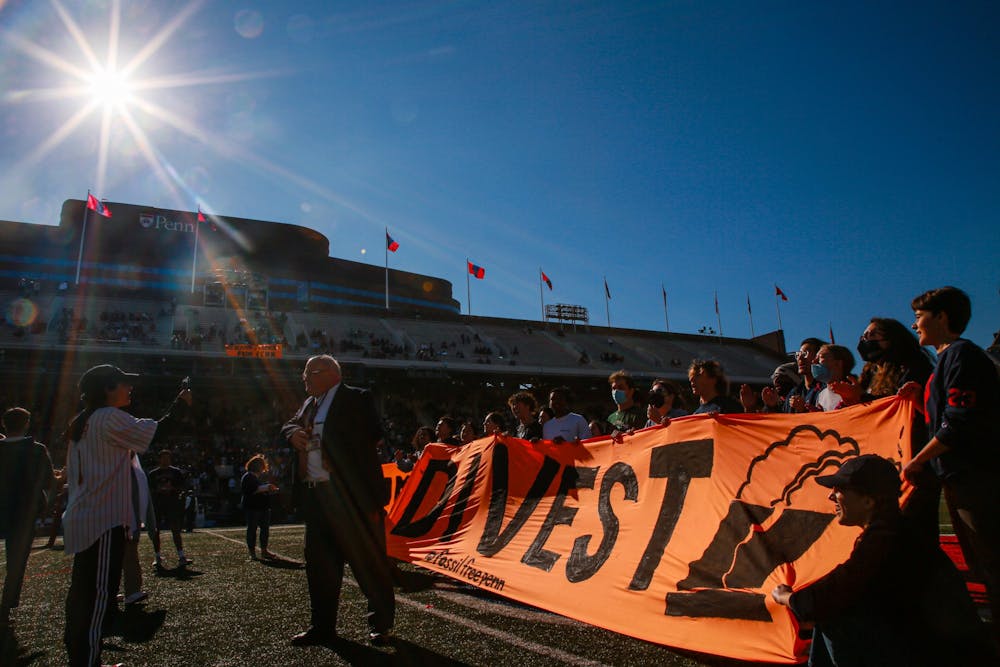
In 2022, Penn’s campus saw protests about the University's impact on the environment and the surrounding community and the new administration’s response to climate demands from students and faculty.
The University began the implementation of its new Energy and Sustainability Initiative, announced the termination of direct investments in the fossil fuel industry, and continued to work towards its sustainability goals outlined in Penn’s Climate and Sustainability Action Plan 3.0.
Feb. 9 — Fossil Free Penn renewed their “Know Our Demands” campaign, calling for the University to cut all ties to the fossil fuel industry. FFP sought to educate the Penn community on issues of divestment and environmental justice through social media posts and in-person teach-ins, with a focus on social justice.
Feb. 24 — In February, the Student Sustainability Association shifted its goals toward expanding the undergraduate climate curriculum rather than focusing on full divestment by Penn from the fossil fuel industry. The change came after a November 2021 announcement that the University would halt new commitments to private equity vehicles dedicated to investments in fossil fuel production.
March 29 — Environmental scientist Michael Mann was appointed in March to begin work as a presidential distinguished professor in Penn’s Department of Earth and Environmental Science in September 2022.
April 19 — Fossil Free Penn began its first encampment, with 28 people initially camping out in eight tents on College Green. The student activists called on Penn to divest from and publicly condemn the fossil fuel industry, restructure its board of trustees to include representatives of the student body and greater West Philadelphia community, and defund the Penn Police Department.
April 25 — FFP ended its first College Green encampment after six days in anticipation of final exams and University-wide student events, including U-Night and Hey Day.
Student organizer and 2022 Engineering graduate Ari Bortman said that the protest was held against "Penn and the administration, not against fellow students."
April 27 — Two days after the encampment ended, 49 Penn faculty members released a letter supporting the students who had camped out with FFP, citing a concern for the rights of student activists to peacefully protest.
“We are concerned that Penn administrators have summoned a group of students to a disciplinary meeting,” the letter read. “Peaceful expressions of protest should be welcomed on our campus, especially those that raise important ethical questions.”
Sept. 14 — FFP began its second encampment, announcing that it would remain “indefinitely” until its demands to the University were met. The group called on Penn to commit funds to preserve the University City Townhomes, completely divest Penn’s endowment from the fossil fuel industry, and to make payments in lieu of taxes – or PILOTs — to Philadelphia public schools.
Oct. 22 — Over 60 protestors affiliated with FFP stormed Franklin Field during Penn’s Homecoming football game, delaying the game by over an hour in an effort to push University administration to meet the group’s demands. 19 people, including 17 students, were detained by Penn Police after being escorted off the field.
Both Penn Athletics and the University released statements that condemned the disruption as an inappropriate expression of free speech which was inconsistent with Penn’s open expression guidelines, according to University spokesperson Ron Ozio.
That night, after 39 days, FFP’s student organizers took down their tents and ended their second encampment on College Green, and organizers said that they wanted to end on a "high note."
Nov. 30 — Penn President Liz Magill and Board of Trustees Chair Scott Bok released a written statement on Nov. 30 clarifying that Penn no longer holds direct investments in 200 fossil fuel companies with the “largest potential carbon emissions content in their reserves.”
FFP coordinators told The Daily Pennsylvanian that the policies outlined in the University's statement are not enough to be considered complete divestment – as they do not address Penn's indirect fossil fuel investments.
Check out the rest of the DP’s Year in Review content here.
The Daily Pennsylvanian is an independent, student-run newspaper. Please consider making a donation to support the coverage that shapes the University. Your generosity ensures a future of strong journalism at Penn.
Donate






